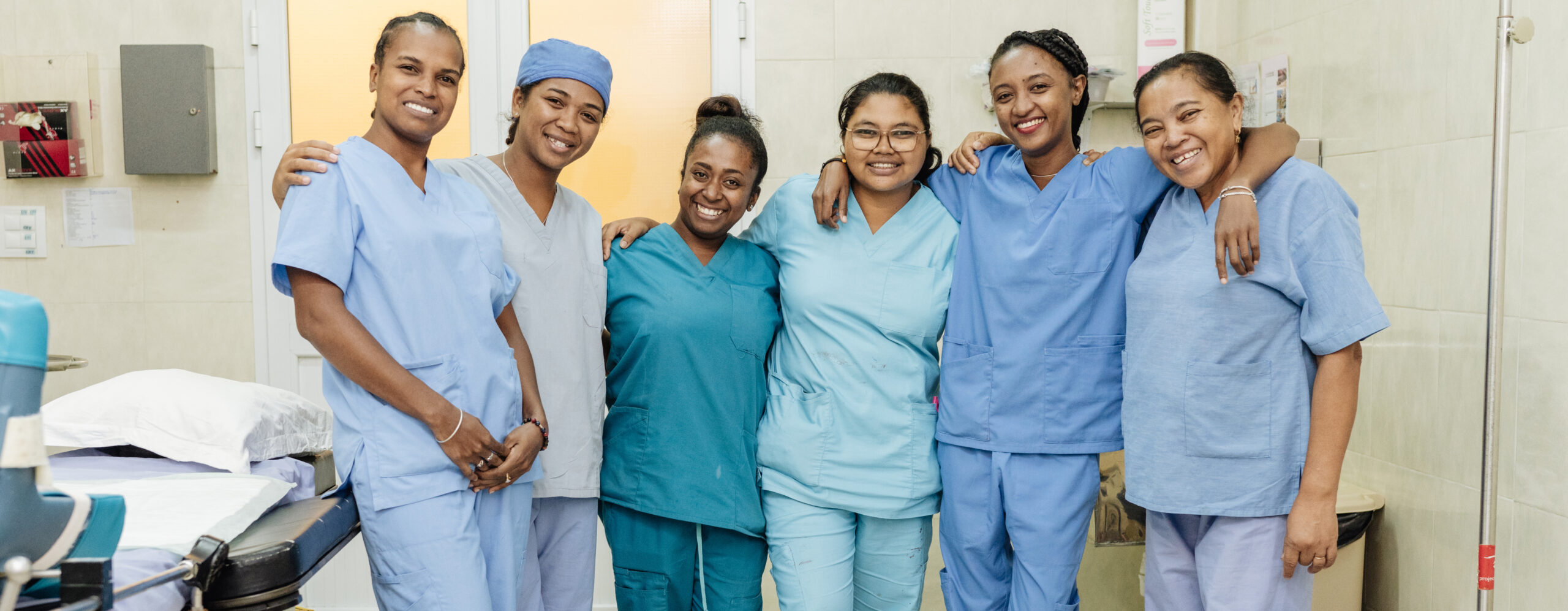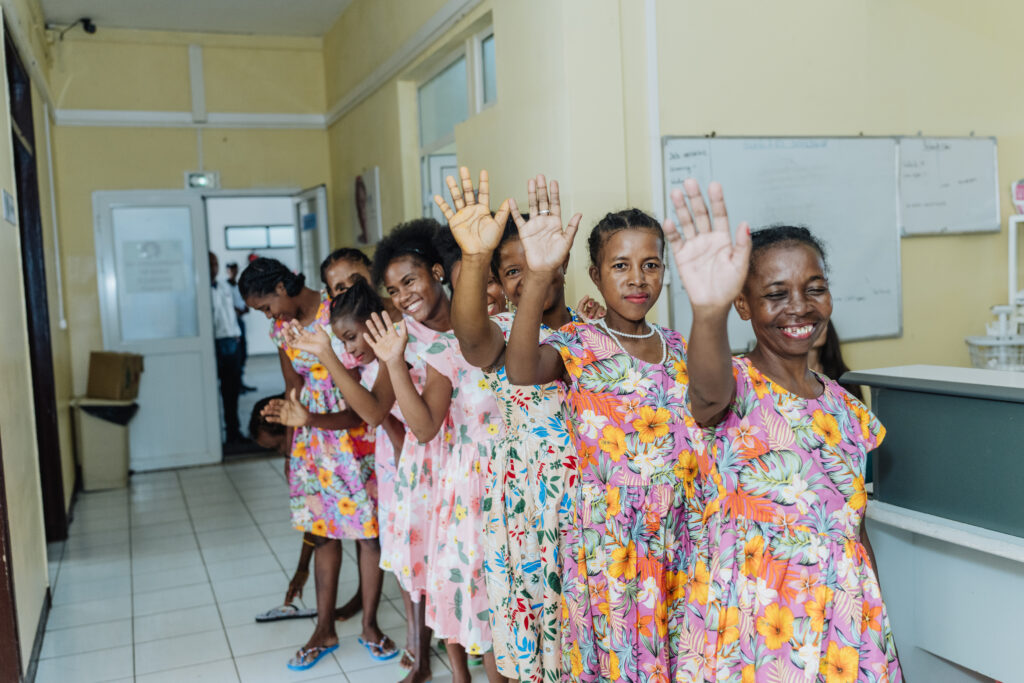Free Fistula Surgeries
September 13, 2024

Ernestine's Story
In anticipation of welcoming her eighth child, a heavily pregnant Ernestine had to make a two-day journey to the nearest hospital in the district of Mandritsara, Madagascar. She sat in a canoe and then walked for miles, eager to see her baby, but her joy was short-lived. Ernestine lost her baby during labor and had to travel back home in pain, walking with a health condition she had never heard of – obstetric fistula. Caused by prolonged and obstructed labor, obstetric fistula is a hole between the genital tract and the urinary tract or rectum, resulting in the leaking of urine, feces, or both.
For the next 14 years, Ernestine lived with this condition. Though her family didn’t abandon her, she lived in isolation from her community, feeling ashamed and unable to work.
Today, Ernestine, now 56 years old, has returned to the happy life she once lived with her husband and children, growing cassava and rice. Along with nine other women, she has been healed and sent home, having received free and safe surgery in a clinic now operated by Freedom From Fistula, surrounded by Malagasy nurses who were trained by Mercy Ships volunteers nine years ago.
A Life-Changing Partnership
Mercy Ships and Freedom From Fistula have a long-standing relationship spanning decades. In the mid-2000s, Mercy Ships established the Aberdeen Women’s Center to provide free obstetric fistula care in Freetown, Sierra Leone.
“We built and ran the facility for several years before transferring ownership to Freedom From Fistula. Today, [they] continue to run the facility,” explained Michelle Bullington, Mercy Ships’ senior programs design director.
According to the World Health Organization (WHO), it is estimated that more than 2 million young women live with untreated obstetric fistula in Asia and sub-Saharan Africa. Every year, about 33,000 new cases of obstetric fistula are recorded in sub-Saharan Africa. In Madagascar, most of these women cannot afford surgery or simply cannot find a surgeon in their community to help them.
Mercy Ships learned of this great need in 2014, so for the subsequent field service in 2015-16, obstetric surgical services were expanded to provide surgeries for more than 300 women. To make this project successful and sustainable, Mercy Ships needed additional clinical ward beds, leading to the renovation of a wing of Centre Hospitalier Universitaire in Toamasina to outfit a ward.
“In the planning for that program, Mercy Ships discussed this need with our friends at [Freedom From Fistula] and set up a plan to transfer the program once again to them,” Michelle shared.
In preparation, Mercy Ships supported Freedom From Fistula’s stakeholder collaborations, while also training surgeons and anesthesia providers, two sterile processing technicians, and 16 Malagasy nurses. When Mercy Ships departed, Freedom From Fistula further transformed the fistula wards into a full treatment center, complete with an operating room.

The Nurses at the Forefront
Seven out of the 16 Malagasy nurses trained by Mercy Ships now lead the fight against obstetric fistula in Madagascar. These nurses cannot stop singing the praises of Mercy Ships’ volunteers who trained them in obstetric fistula care. Because of the dedication of these volunteers, today, nurses like Natacha and Justinella are working at Freedom From Fistula’s obstetric fistula clinic, heading the operating room and ward respectively.
“It was an international training, and I can use my training everywhere. It’s very useful at the operating room so I can help many patients,” said Natacha, operating room manager.
When the Africa Mercy sailed away in 2016, these Malagasy nurses stayed at the clinic to continue helping women.
“Obstetric fistula is another thing. It’s not the same as every clinical problem. It’s about the woman and their suffering. They are losing families and friends, husbands, and babies,” Natacha explained. “I think it’s very sad, and I am a woman. I cannot imagine [being] in their place. Our surgeon is also from another country, so why not? I am Malagasy. I can help these women.”
These nurses know the impact they make in the lives of women, so with compassion, love, and care, they are committed to training more nurses in obstetric fistula care and helping more women restore their dignity.
“My motivation is every Friday, when you hear their stories and see the smile on their faces that they are healed – you feel like you have done something,” said Justinella, ward charge nurse.
In this same clinic, a young man, Zara Albertin, who was also trained by Mercy Ships, works as a sterile processing technician.
“The training they provided was sufficient. They are experienced and they shared their knowledge for free,” he said. “They were really pleased to share it. It made me grow and changed my life, and my understanding about sterilization. It really changed me.”
This obstetric fistula clinic, this staff, and most importantly, these discharged patients who sing and dance and beam with joy – all are a testament to the enduring impact of training and partnership. Today, the clinic performs an average of 359 free obstetric fistula surgeries per year, and this number is expected to increase to 500 this year. It has also become a training center for national and international surgeons to gain invaluable skills and experience for their practice.
In recent years, Mercy Ships has continued to collaborate with Freedom From Fistula, providing equipment, beds, and support for additional infrastructure.
In 2024, the Africa Mercy returned to Madagascar to perform life-changing surgeries, operating with a surgical schedule best suited to the nation’s current needs. Due to the outcome of this successful partnership with Freedom From Fistula, this year’s surgical plan does not include women’s health or obstetric fistula surgeries. Mercy Ships will also continue to focus on training and mentoring healthcare professionals, including surgeons, anesthesia residents, nursing students, dental and biomedical students. Once again, through collaboration with local partners and education, training, and advocacy programs, Mercy Ships is committed to seeing lasting change for the people of Madagascar.
Learn more about Obstetric Fistula here.

